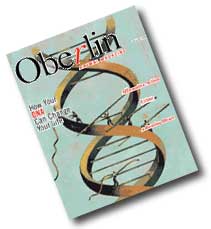 |
 |
|
|
Oberlin
Alumni Magazine welcomes mail from readers. Please address your
comments to Oberlin Alumni Magazine, 145 W. Lorain Street, Oberlin,
OH 44074-1023, e-mail: alum.mag@oberlin.edu,phone:
440.775.8182, fax: 440.775.6575. The editor reserves the right
to edit for clarity and space.
Doctor's Success is No Surprise To those of us acquainted with "Dr. Billy's" vivid imagination, scientific talents and fascination with pharmacological phenomena (Winter 1999), his success as a biomedical innovator is not all that surprising. For me, the question was always whether his first-rate comic timing and generally good-natured approach to life would suffer in the process. Indeed, the thank you letter from Bozo the Clown "says it all." Thomas
L. View '82
Washington,
D.C.
I was fascinated by Geoffrey Blodgett's account of the 1892 Oberlin victory over Michigan. I remember reading about it, but was unfamiliar with the controversial outcome. In the late 1950s, when I was sports editor for The Oberlin Review having to document some rather unsuccessful weekly football endeavors, I tried to enliven the pages by reminding Oberlinians of by-gone glories. Reading back through turn-of-the-century Reviews (i.e. 1890s), I was gratified to uncover some dramatic victories over Ohio State. For some reason, a 60-6 victory sticks in my mind, although the decades may have played tricks with my memory. Now at Rutgers, where football victories come at long intervals, I find my colleagues know about the Heisman trophy, but not about Heisman the Oberlin ball player. It's a memory worth resurrecting periodically. Michael
Gochfeld '61
Somerset,
New Jersey
Affirmative
Action, Private Colleges
Readers of the Winter issue's articles on affirmative action may have come away thinking that the recently filed federal court challenge to the University of Michigan's affirmative action policy could lead to Oberlin's own affirmative action policy being shut down. The articles suggest that the local federal appeals court might rule, as one did in Texas several years back, that affirmative action violates the Fourteenth Amendment's guarantee of equal protection under the law. Even if the local federal appeals court were to hand down such a decision, however, it would have no direct effect on Oberlin. The Fourteenth Amendment's requirement that no person be denied the equal protection of the law is a right that runs only against the government--not against private persons or organizations. If Oberlin's local court of appeals some day rules that affirmative action denies non-minority applicants the equal protection of the law, then state schools in the region like Michigan and Ohio State would have to drop or change their affirmative action programs. Private colleges like Oberlin would not be directly affected. Absent other possible developments that the articles do not describe--repercussions from such a decision under federal laws allocating tax-exempt status and educational financing, for instance--determining what weight to give to race in the Oberlin admissions process would remain an entirely Oberlinian decision. Jonathan
M. Freiman, Esq. '87
Robert
Bernstein Fellow in International
Human
Rights, Yale Law School
Editor's
Note:
Non-compliance with a Constitutional Amendment could jeopardize
federal funding in the form of research grants, student aid,
etc., allocated to private colleges.
|
||
|
Letters
|
||
|
|
||
 Reviving
Football Glories
Reviving
Football Glories